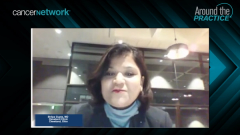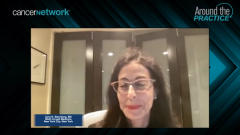
Metastatic Urothelial Carcinoma: Does FGFR Status Impact Use of Maintenance Avelumab?
A brief review of whether FGFR status in metastatic urothelial carcinoma should impact treatment approaches.
Episodes in this series

Transcript:
Peter H. O’Donnell, MD, PhD: We’re getting some questions around FGFR. Maybe you did the next-generation sequencing as they’re getting platinum. If you had a patient who has an FGFR alteration, would you still offer avelumab maintenance? Shilpa, can I start with you? If you knew the patient was FGFR altered, would it influence your decision to offer avelumab?
Shilpa Gupta, MD: That’s a great question, Peter. Unfortunately, in the JAVELIN Bladder 100 trial, we don’t know the FGFR status of patients or whether the FGFR-positive patients had a good response or not. But the way I see this, if they have FGFR-mutated tumors, it gives us an additional option down the line. Because avelumab maintenance timing is crucial, I’d rather do that first and reserve FGFR inhibitor for later as opposed to not utilizing maintenance at all. At some point, they may need FGFR inhibitors for sure.
Peter H. O’Donnell, MD, PhD: Cora, you’re nodding.
Cora N. Sternberg, MD: I agree with everything that was just said, absolutely. Sometimes my colleagues ask, because they knew I participated in the trial, “What should we do?” I always tell them to give avelumab first and then if they progress later, we have something in our pocket to use, which is FGFR inhibitors.
Peter H. O’Donnell, MD, PhD: Matt, I know the data have been somewhat mixed, but at 1 point I thought maybe FGFR-altered patients wouldn’t respond well to immunotherapy. Do you think that’s holding water?
Matthew T. Campbell, MD, MS: It’s still a muddy picture. We have these very impressive panels that come back to us, and we have patients who have FGFR3 as the only alteration. But we also have groups of patients who have a number of mutations, and with FGFR, it’s hard to figure out if it’s the passenger or the driver. It’s a complicated topic, but my sense is offering them avelumab maintenance at that time makes good sense. I completely agree that you do have an option later on for patients.
Transcript edited for clarity.
Newsletter
Stay up to date on recent advances in the multidisciplinary approach to cancer.










































